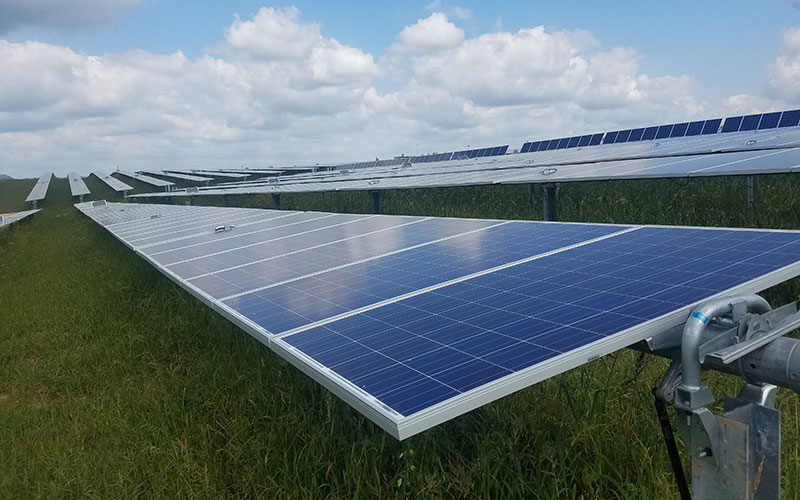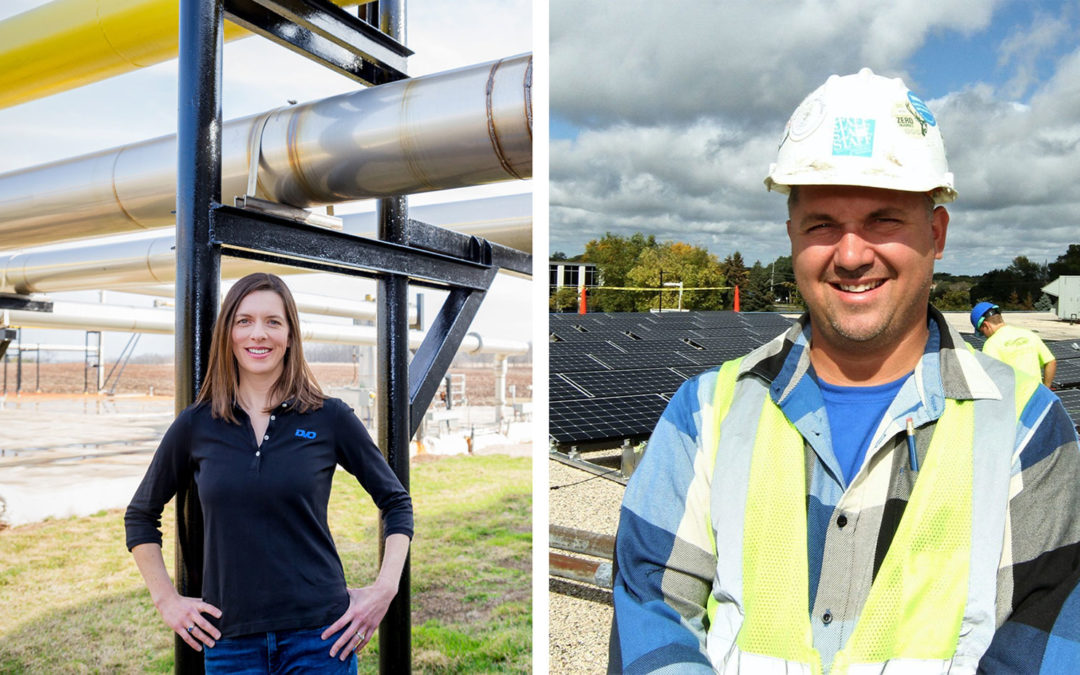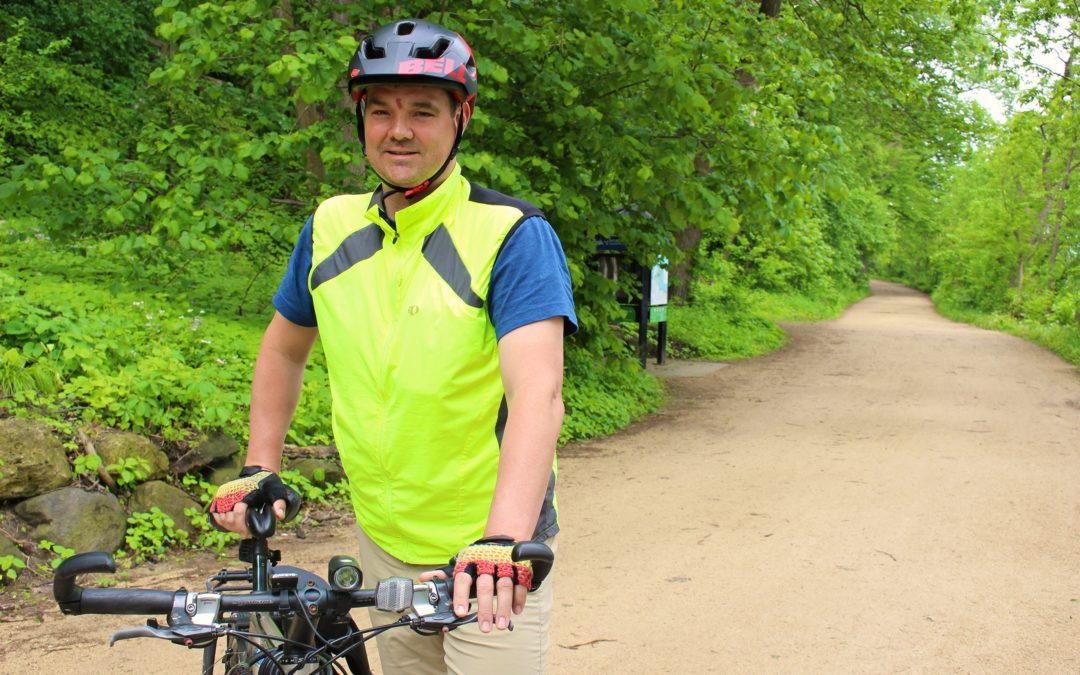
by Michael Vickerman | Aug 22, 2018 | Local Initiatives, RECs, Renewables, Solar
A recently signed contract between the City of Madison and OneEnergy Renewables, LLC, a solar developer headquartered in Seattle, will result in the construction of five community solar arrays totaling 14 megawatts (MW) next year in western Wisconsin. The City’s decision to provide financing to this project represents the largest commitment to date by a single Wisconsin customer to expanding solar capacity here.
Expected to begin operating in mid-2020, OneEnergy’s five arrays should produce about 20 million kilowatt-hours of clean electricity a year over its operating life. That output equates to more than one third of the City of Madison’s own consumption.
OneEnergy’s solar arrays will be built in the service territories of the municipal utilities serving Argyle, Cumberland, Elroy, Fennimore, and New Lisbon. These five utilities will receive the electricity at a price comparable to what they currently pay for wholesale power. However, under the city’s contract with OneEnergy, Madison will receive 25 years of renewable energy credits, or RECs, associated with the project’s output.
The $1.4 million contract will move Madison substantially closer to its goal of sourcing 100% of the electricity used for city operations from renewable energy sources. Madison is one of three Wisconsin municipalities that adopted a 100% renewable energy goal. The others are Eau Claire and Middleton.
Approved by Madison’s Common Council in July, the city’s REC purchase is an essential element in the overall financing for OneEnergy’s solar project. Though the power from the arrays will flow to five different municipal utilities, the agreed-upon purchase price will not, by itself, pay for the project’s full cost. But with the additional revenue stream coming from the City’s REC purchase, the developer should have no difficulty in securing outside investors to participate in the project.
“Through this creative arrangement, new community solar projects totaling 14 MW will move from the drawing boards out into the western Wisconsin landscape,” said RENEW policy director Michael Vickerman. “At a remarkably low cost, the City will expand solar generating capacity in Wisconsin by 15%, and these new sources of zero-carbon power will provide tangible benefits to the City, the rural communities hosting these arrays, and our planet.”
Madison’s action is the second major REC purchase by a Wisconsin customer to support the construction of community-scale solar projects. Last November, LaFarge-based Organic Valley Cooperative, the nation’s largest cooperative of organic farmers, entered into a similar arrangement with OneEnergy to purchase RECs from 12 MW of solar capacity serving another group of small municipal electric utilities. Through that transaction Organic Valley expects to reach its goal of being 100% renewably powered by 2020.
Constructing both sets of arrays will involve only one mobilization of construction equipment and crews. According to OneEnergy, combining the Organic Valley and City of Madison projects into one coordinated build-out will reduce construction costs, which helped make project participation more affordable for both the utility off-takers and the REC purchasers.
OneEnergy is also developing a 4 MW project next to Middleton’s airport with the aim of supplying the City of Middleton and a Madison-area business with solar electricity.

by Jodi Jean Amble | Aug 8, 2018 | Biogas, Jobs, Renewables, Solar, Sustainability, Wind
More than 75,000 Wisconsin residents now work in clean energy industries, including individuals in all 72 counties, according to a new analysis of energy jobs data from Clean Energy Trust (CET) and the national, nonpartisan business group E2 (Environmental Entrepreneurs). Wisconsin’s clean energy workforce employs more than all the waiters and waitresses, computer programmers, lawyers and web developers in Wisconsin combined, according to Department of Labor Employment Statistics.
Energy efficiency once again led all clean energy sectors in Wisconsin, employing 62,299 workers – accounting for 8 in ten of all clean energy workers.
Renewable energy generation came in second with over 5,600 jobs – led by solar and wind (5,351).
“Wind, solar, and energy efficiency are the lowest-cost options for utility companies and our state’s homes, businesses, and public-serving organizations. Wisconsin has a tremendous job creation opportunity because these clean energy technologies are now cost-effective and ready for prime-time,” said Tyler Huebner, Executive Director of RENEW Wisconsin.
Across the entire 12-state region, Clean Jobs Midwest found that clean energy employment totaled 714,255 at the end of last year.
Key findings about Wisconsin’s clean energy workforce include:
• Renewable energy, led by wind and solar, employs 5,660 Wisconsin residents
• Over 2,500 Wisconsin residents now work in grid modernization and energy storage
• The majority of Wisconsin’s clean energy jobs are in construction and manufacturing (75.30%)
• Clean fuels and clean vehicle technologies employ 4,565 workers
• Employers project 2.0% clean energy job growth in 2018
• Small businesses are driving Wisconsin’s clean energy sectors, with 67.90% of clean energy businesses employing fewer than 20 individuals.
• 11% of Wisconsin residents employed in clean energy are veterans

by Jodi Jean Amble | Aug 3, 2018 | Solar
MADISON, Wis. – A University of Wisconsin-Madison professor is biking 2,000 km around the Upper Midwest beginning on July 28th to increase awareness of solar energy and raise funds for a solar energy project in Puerto Rico.
The bike journey, known as #BiketheSun, will take James Tinjum, Ph.D., of UW’s Department of Engineering Professional Development to 50 solar energy sites across Wisconsin, Illinois, Iowa and Minnesota. Riding an electric bike prototype with a plan to bike 160 km per day, the trip will take Tinjum about two weeks to complete.
“Solar is an energy solution that provides clean, renewable, domestic energy across the U.S.,” said Tinjum. “In the last year, if you include rooftop solar, about 2.5 percent of our nation’s electrical supply came from solar. Although this energy source is growing, there is still a lot of room for expansion.”
Along with bringing attention to solar energy, the purpose of #BiketheSun is to raise funds for Solar Para Niños, a solar installation project at a non-profit shelter in Puerto Rico for abused children. The panels will reduce the shelter’s energy costs by as much as $1,000 per month, allowing the shelter to invest more money into educational and counseling services the children. The project will help provide long-term, sustainable relief after Hurricane Maria devastated the island last September.
“Puerto Rico’s power grid was completely knocked out during the hurricane and electricity was not restored across the island for as long as nine months after. Renewable, distributed energy sources like solar will provide more resilient and reliable power, particularly for when another natural disaster occurs,” Tinjum said.
Puerto Rico has the highest electricity rates in the U.S., according to Tinjum. Even though the island has excellent solar resources, it produces over 95 percent of its electrical energy by burning imported natural gas, coal and oil – which are not only expensive, but environmentally unsustainable.
“With the installation and promotion of more renewable sources such as solar energy, institutions like the children’s shelter will substantially reduce their monthly energy bill, as well as move toward a more sustainable use of energy,” he said.
Last summer, Tinjum embarked on a 2,000-km bike ride called #BiketheWind to raise awareness about wind energy, so he’s familiar with long trips triggered by good causes. To prepare for this year’s ride, Tinjum is biking upwards of 24 hours a week, getting in hours by biking to “everything,” including work, groceries and intramural soccer matches.
Tinjum departs for his journey on Saturday, July 28 from Madison, Wisconsin.
To keep up with his journey, visit solarparaninos.com/bikethesun and follow #BiketheSun on social media. Visit solarparaninos.com/donate to donate to the Solar Para Niños project fund.



